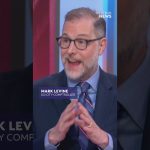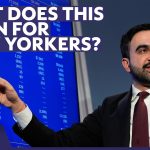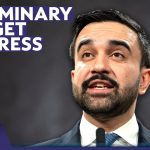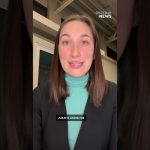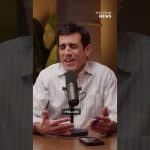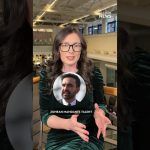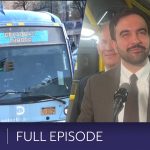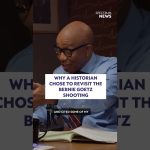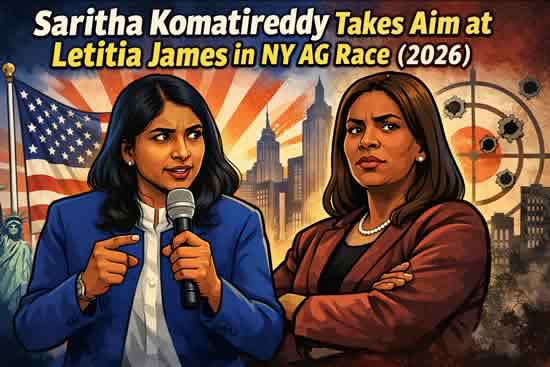Gary Byrd: Well, it’s time for you to Hear from the Mayor, and our mayor wants to hear from you as well. Standing by, the 110th mayor of New York City, our brother, who as Brother Lloyd Williams indicated, has walked with us through the battlefields of New York City across several different power positions, certainly as an officer in the Police Department, the NYPD; state senator from Brooklyn; as borough president as well; and now, as the 110th mayor of New York City. It gives us great pleasure to welcome on the air at WBLS on his show, Hear from the Mayor at WBLS. Let’s welcome Brother Eric Adams. Good morning, my brother.
Mayor Eric Adams: Hey, brother. How are you, man? It’s great to be on. I really look forward to these shows, and I just want to say to New Yorkers, welcome back to another episode of Hear from the Mayor. I’m actually, you know, taping right from Gracie this morning, you know, just got back from a South American fact finding mission with my team, we were in Colombia, Ecuador and in Mexico.
So, I look forward to a nice chat today, and we want to tell everyone you can call in if you want, if you have a question or a point of view. Dial in to (212) 545‑1075 – (212) 545‑1075. And you also can hear me on my listen to the Get Stuff Done cast. We have some amazing guests, Gary, like you know, on that cast. You can also text with Eric where you can hear from me on how the city is doing and stay up to date on some news.
And finally, you can sign up to hear from me by visiting nyc.gov/hearfromeric. So, many ways to hear from me and I’m just, you know, I enjoy communicating with New Yorkers every day.
Byrd: Absolutely. And of course, they love to have you there as well. Again, that number, (212) 545‑1075. Not only if you to hear from the mayor but to talk to the mayor. That will be coming up in just a few moments.
Mr. Mayor, in relationship to the trip that you just took, obviously it was a fact finding on one level, but you wanted to see from a position, as you said to me a moment ago, down on the ground. Why was that important to you?
Mayor Adams: And that’s my style, and I’ve always been that way. You know, when I first took office, I would go to crime scenes here in the city and talk to the victims and the family members and sit in hospitals. When we had the fire, you know, in January up in the Bronx where we lost a lot of people from the African Diaspora, I wanted to be there, because sometimes we sit in the sterilized environments of our executive chambers and you don’t see what’s happening to people on the ground.
This humanitarian crisis, there’s no end in sight, and I wanted to go to the source. And by going to those cities, those countries like Ecuador, Mexico and Colombia and seeing what is happening, and going to the Darién Gap. Many people don’t even know about this location, but able to speak to those leaders, those CBOs, those on the ground groups, speaking with some of the migrant and asylum seekers who are making their way out of, you know, some real draconian issues, it was just important for me to see it firsthand.
And I went out with a good team. You know, one of them is Commissioner Castro who is here with me today. He was a Dreamer. He crossed the border illegally with his mother as a five-year-old child, and now he’s in charge of Mayor’s Office of Immigrant Affairs. And so, it was sort of an emotional journey for him, because we went back to Puebla, the city that he and his mom left to come here to America. So, it was a real eye opener for me, Gary.
Byrd: Absolutely. It had to be. You have special guests with you this morning, and we’d like to hear from them. Why don’t you set up the introductions.
Mayor Adams: Yes. As I stated, Commissioner Castro. Commissioner Castro joined me on this trip, but also we went to the border of El Paso several months ago— last year, actually— he was with me then. But he is just really at important eye on the entire immigration issues, not only from South and Central America but those who come from the Caribbean Diaspora, from the continent of Africa, all of these issues when we talk about immigrant, migration, asylum seekers, you know, he comes with a personal knowledge and a well understanding. You know, commissioner, so you can give an overview and talk about the guests that you have here as well.
Commissioner Manuel Castro, Mayor’s Office of Immigrant Affairs: Thank you so much, mayor, not only for this opportunity to travel with you to Latin America and experience this with you and the team, but also for giving a voice to this important issue that, frankly, we’re not hearing from anywhere else in the country. And as we heard over and over in our trip, we need leadership, and this is the kind of leadership we need.
And you’re right, New York City is an international city, so we’re on the international stage to make sure that everyone hears that this is a humanitarian crisis that is impacting New York City but many other places in the country, in the world. And but let me say, it was such an emotional experience. I think this is the kind of thing you never forget.
There’s a handful of experiences in your life that define you, and I think this is the kind of thing that you just keep with you. Just like crossing the border as a child with my mother, that has marked me so much that I’ve dedicated my life to making sure that other people don’t have to do that; or if they had, that they have the support that they need once they’re here.
And that’s certainly the experience for so many New Yorkers. I think one thing that I want to make sure everyone knows is that New York City is home to over three million foreign‑born individuals. All of them had to take a journey from their home country to make it down to New York whether they crossed the border or overstayed their visa or came here on some legal pathway like refugee status like our International Affairs commissioner.
But they can all tell you their experience having to leave their home country, having to leave their family behind, and the first time they go back, right? And frankly, it’s very emotional. So, three million immigrants in New York City can now say our mayor understands us. And for many, like Yorgen sitting here next to me who himself, a Venezuelan refugee who left Venezuela, went to Ecuador— Quito, where we visited– then went to Bogotá, went to Colombia, then went to the same beach we went to at the Darién Gap and entered the Darién Gap through the same locations we visited this past couple of days, now he’s in New York City.
And I’m very proud that…he was one of the first people I greeted when he stepped off the bus, and my office helped him apply for asylum.
And now here he is at Gracie Mansion. I’m telling you, this is…this can only happen in New York. And so, Yorgen, if you want to… [speaks in Spanish].
Mayor Adams: And I want to set the stage. You know, the Darién Gap is where hundreds of thousands of people come through and walk through this jungle‑like atmosphere. Extremely dangerous, many people exploited, women are sexually assaulted. You know, it’s dangerous with children. M any people don’t make it out. They’re preyed upon by smugglers. To sort of get through, it’s trauma, you know, you have to deal with that very real trauma.
375,000 people went through the Gap this year. That’s 100,000 more that went through from last year, 200,000 that went through from 2021. So, you see this escalation and just this large number of people that are walking through this Darién Gap. So, I want you to understand when we talk about this space, that’s, you know, this is what this young man had gone through.
Commissioner Castro: [Speaks in Spanish.]
Yorgen Albeiro Torres: [Speaks in Spanish.]
Commissioner Castro: [Translating:] Good morning. First of all I want to say thanks to God for all of this, really. To be here, it’s amazing to be with the mayor and with the commissioner. [Inaudible] difficult now you have seen some of what [inaudible] to cross and how difficult it is. The jungle, the Darién Gap, Ecuador and all these countries that we have to go through in order for us to make it here.
A few years ago, the [inaudible] regiment really made it, forced us to leave the country. So, as a result, I had to leave and go to Ecuador, I was there in Quito. The situation in Ecuador is also not that well. So, I had to decide to take a journey, me and my family, six other people. And that started in Colombia and [inaudible] this is where we visited.
So, we had to take the boats and then travel across the sea to enter the jungle. So, we had to enter the jungle through indigenous controlled land. And inside the jungle itself it’s a chaos, too many obstacles. People get assaulted, raped and kidnapped. I almost lost my mother who was with me.
We entered in winter time in a river that we were crossing my mother did not have enough strength. We were crossing grabbing on by rope and she almost let go. But we were there as a group, so we were able to help each other out.
Mayor Adams: And you know what, we’re going to do our next Get Stuff Done cast, I want to invite you on and I want you to just really do a whole series around that. But we just wanted people to understand the human aspect of this.
[Crosstalk.]
And so, and we need to dismiss some of the false rumors out there. Number one, people are saying, okay, you’re giving everything to the migrant and asylum seekers, you’re denying everyday New Yorkers who are dealing with poverty— just untrue. The condition the asylum seekers and migrants are living in, congregant settings and tents, getting the basics because we have really run out of room and it’s unfair for us to continue to put people in this inhumane condition.
And that’s what we were sharing on the local news stations. And so people who believe that we are treating the migrant and asylum seekers above everyday New Yorkers is just not true, and we need to put a rest to that theory.
Commissioner Castro: You’re so right, mayor. I mean, I think what we were able to do in Latin American was so significant because we were there to speak to as many people as possible through their local news— which is what they’re consuming— and through some of the national news like Televisa, which everyone watches, which you were on, to say to people, look, what you’re hearing from these smugglers, what you’re hearing on social media is incorrect. You know, you’re not going to get all these things that they claim you’re going to get, and people are selling you a lie, and you’re risking your life.
And what we saw there— what moved me— was how many children were being taken on this journey. And we kept hearing from people over and over, half the people that enter the jungle make it. You know, so we’re putting the lives of people at risk and especially children by letting them believe they’re going to get all these things, which they’re not getting.
Mayor Adams: And well true. And the level, Gary and listeners, of danger. I rode around there in an armored vehicle because of the level of threat that people felt. The national police that took me inside the Darién Gap, they made it clear they did not want me to go on the ground because of the smugglers, because of those who are dealing drugs, the wars that are taking place between groups.
The only way they’d allow me to go in if I agreed that I had to look, listen to their instructions, and when they told me it was time to move, I had to move. They would not allow me to wander around because of the level of threat and concern for the safety of those we were traveling with. That threat is with, these young people are living through all the time.
The other misnomer we want to dismiss is that these migrants and asylum seekers want to come here and get everything for free. That is untrue. Over and over again they stated, we want nothing from free from New York and America. We want to work. We want to work. And when I think about what my brothers and sisters have done who are first responders, work in hospitals, who were there for us during Covid, these will all immigrant groups and immigrant populations that started out here in this country and was able to become taxpayers and participate in this country. And no one knows that better than those of us who come from the African diaspora and how we made our way and built this country.
So, this is a significant moment that we have to respond to; if not, it’s going to engulf this entire region and if not this globe when you see this global shift that’s taking place across the globe.
Byrd: We’re going to take a quick break and set up for your telephones coming up. You’ve heard from the mayor and the mayor wants to hear from you at (212) 545‑1075, (212) 545‑1075. Our thanks to Commissioners Castro and Yorgen. And thanks to you for joining us this morning on Hear from the Mayor at WBLS.
[Commercial break.]
Byrd: We’re back with Hear from the Mayor, and the mayor wants to hear from you at 107.5 WBLS. Let’s get back right now with our mayor, Eric Adams.
Mayor Adams: Yes. Thank you, brother. And just to tell the callers, please, we always want to hear from you. (212) 545‑1075. I really want to hear from you, but also just want to really… my heart goes out to the hundreds of lives that were lost in Israel, thousands who were injured there.
There’s really no good time to continue to watch violence to happen, and I just really want to say as we’re watching this play out. I was just in that region, you know, a few months ago, and we saw how at the Western Wall you saw Jews, Christians, Muslim all living in unison. So, this violence is really something that is ripping at the heart of all of us.
Byrd: Again, your calls, (212) 545‑1075. First name and where you’re calling from this morning at 107.5 WBLS. Again, your first name and where you’re calling from.
Question: Rodney from Queens, New York.
Mayor Adams: How’s it going, Rodney?
Question: I’m good, Mr. Mayor. How are you doing?
Mayor Adams: Quite well.
Question: Listen, I want to know, Governor Abbott, what is…where is the repercussions coming from with what he’s doing? Like he’s…where are the resources coming from? Right? Like I don’t hear nothing about the taxpayer money that he’s spending to send these buses every day. Like, why is he not…like the government, the federal government or the Biden administration not cracking down on this dude, because all he’s doing is sending them to democratic cities, your city, our city, our beloved New York. I mean, D.C., Chicago, Denver. You know, I mean, Philadelphia, I mean, where…why is there no…LA, why is there no repercussions on Governor Abbott?
Mayor Adams: That’s a great… [question] brother, I’m so glad you raised that question, because you know, people were saying, well, Eric, why don’t you just stop the buses from coming in? I don’t have the authorizations to do that. I don’t have the power to send people anywhere, mandatory, I’m restricted within the federal rules. And Governor Abbot was using FEMA dollars and other dollars to send people up here, taxpayers’ dollars. And I am with you one hundred percent, there should be a national response. That’s what I’m saying about a decompression strategy, at the border. People should be sent throughout the entire country in a very organized way not in this disjointed way that you’re seeing.
We have 108,000 cities and state….cities and municipalities and villages. If everyone plays a role this won’t fall on the back of those cities like you said. Chicago, Chicago has migrant and asylum seekers sleeping inside police precincts. We see what’s playing out on my good friend Mayor Bass in Los Angeles. We can’t allow this to happen and fall on the backs of every day city taxpayers.
Byrd: There’s something I think was also in the mind of many people, Mr. Mayor, in relationship to when you were there. You were attempting, as I understand it, to also explain to the population there that this was not simply an open door to just walk through and the jobs, and if you will, let’s say, gold was flying from everywhere, because as I understand it there were some misconceptions down there.
Mayor Adams: Yes. No, well said, Gary. And what happened is their social media platforms that many of the smugglers who have turned this into a business, they target people on the social media platform— TikTok, Facebook, Instagram— saying if you come to New York you’re going to get, live in a 5‑star hotel, you’re going to automatically get a job, the city will take care of you. And people believe that with these false promises.
So, my goal was to go to each one of these countries that were impacted such as Colombia, Ecuador and Mexico and speak on their various social media platforms and news outlets and say this is not the reality. You come to New York City, we are out of space. You’re going to be dealing with some real draconian issues that is not conducive for anyone to live through but because we are really taxed to the maximum. And that’s why I went down there to speak one on one with those outlets there.
Byrd: Before we go to our next caller, what was the response and what was that interaction, conversation like?
Mayor Adams: And that’s…you know, because think about it, brother. You know, I have a son, Jordan, and if I was living somewhere with violence or what’s happening in the west coast of Africa where climate conditions is not allowing the right…that’s conducive to grow food, or you’re looking at some of the other issues, destabilization in Venezuela, you want your child to survive.
So, people are so desperate that they’re willing to place themselves in this crossing because of these conditions in their own homeland. We must now look at what’s happening in these individual countries and play a role of how do we assist to stabilize so we don’t have this influx that we’re seeing here. People are just determined to come to America, and those lies that were told is sort of motivating them to continue to do so.
So, we have a dual role to dispel those lines and then partner with those leaders in these countries so that we can make sure that people can live in their home country appropriately. And this is global, brother. This is happening across our globe right now, and we’re receiving the brunt of it here in New York City.
Byrd: The show is called Hear from the Mayor, and it’s the mayor himself, Eric Adams on your radio at 107.5 WBLS. Our number is (212) 545‑1075 ‑‑ (212) 545‑1075. This is the only situation we’ve done for a few broadcasts, a lot of folks don’t even necessarily know, I know some of you are on your way to church, we get that, too.
Those of you at home, those of you who are leaning back and saying, I’m in my car, yo, get to the side of the road [laughter] and make that call. (212) 545‑1075, New York City, Manhattan, Brooklyn, the Bronx, Queens, Long Island, Staten Island, wherever you are, your chance to talk to our mayor, the 110th mayor of New York City, Brother Eric Adams. Let’s go to our phones right now with your chance to talk to our Mayor. Good morning. First name, please, and where you’re calling from.
Question: Audrey, Harlem.
Byrd: Go right ahead, Audrey.
Mayor Adams: We can hear you, Audrey. How are you?
Question: I’m okay, thank you. I was calling because I’m not opposed to the asylum seekers coming to New York; however, I am opposed to you guys taking out our New Yorkers out of the shelter system and putting them inside…and then putting the asylum seekers inside of there. What happens to our New Yorkers that need the help?
Mayor Adams: And that’s why…and I’m glad, that’s why we’re doing this show, because we need to separate the facts from reality. No one is displacing any New Yorker; and in fact, the asylum seekers are going to what’s called HERRCs— Humanitarian Relief Centers here there are tents. When you look at Randall’s Island, when you look at Creedmor, when you look at what’s going to Floyd Bennett Field, they’re tents.
And there’s no displacement. No one is going into the hotels and removing long‑time New Yorkers. That’s part of the myths that is out there that we want to dispel. We’re not treating any group above another group, we’re not treating long‑term New Yorkers who are struggling, and we’re not pitting them against the asylum seekers.
The problem is that this is costing us $5 billion of taxpayers’ dollars, and we’re not getting the help on the federal level that we need. And those dollars are going to come from somewhere, and that is what the real issue that we all need to raise our voice on.
Question: Right. I hear you. I hear you. But the fact, I saw it on the news, that you guys are taking the people out of the Queens shelter system and there are New Yorkers that already…they are taxpayers, they’re already working, and then you’re displacing them and taking them into Staten Island. I find that to be very unfair. How do we help other people from other countries if we’re not even giving back to our own?
Mayor Adams: Okay, Sister, I can only…I can share with you the truth. And the people who went to Staten Island are one hundred percent asylum seekers ‑‑ one hundred percent asylum seekers. You know, my mother used to tell me as a little boy, don’t believe everything you hear on the news. I’m speaking directly to you. The people who went to Staten Island that all that protest is about are one hundred percent asylum seekers. So, I can only be honest with you; and then, you know, you have to just take me by my word. I wouldn’t tell you a lie.
Byrd: Sister, thank you for your call. Let’s welcome our next call to Hear from the Mayor. Thank you again, Sister. 107.5 WBLS, the mayor is standing by, he wants to hear from you. First name and where you’re calling from. Yes, you’re on the air. Go right ahead, please.
Question: How are you doing?
Byrd: Go right ahead, please. Thank you.
Question: Okay. Now, here’s why I’m opposed to it.
Mayor Adams: What are you opposed to? Hold it, when you say “opposed to it,” what is the “it”?
Question: The democratic party, AOC, the de Blasios and everyone else, they created policies that made it almost impossible for landlords to rent their house fairly and to evict tenants, to collect rent and so forth. All of a sudden, we have all this immigrant crisis, but it’s a manmade crisis that started at the border. It’s not a humanitarian crisis.
Byrd: Caller, our time is running real close, so I want the mayor to be able to respond to what you’re asking. So, what he’s saying he’s opposed to, Brother Eric, is the immigrant crisis and our handling of it in New York.
Mayor Adams: Yes. And I think the way we handled it, the way we will handle anyone that’s in need, that includes long‑term New Yorkers, migrant, immigrants, of you know, we have an obligation here that we have done our job appropriately. I would love that brother to use his voice to make sure national leaders should come up with real immigration reform and to make sure that our tax dollars could go to continuing to move our city in the right direction. So, we’re going to need that type of energy for people to point the concern and the passion and compassion in the right place and not to have it displaced.
Byrd: And Mr. Mayor, as we know, the conversation doesn’t end here. Why don’t you lay out one more time for those who didn’t hear it earlier how they can connect with you across your platforms.
Mayor Adams: And always looking forward to hearing from New Yorkers. Number one, you can go to nyc.gov/hearfromeric. This will keep you up to date. You can sign up. You could also text me at textwitheric, where you can hear from me on how the city is doing; or, you can listen to our Get Stuff Done cast.
There are many ways to hear from us. Our goal is to do direct to consumer communication so we can dispel the myths like that sister raised with the Staten Island conversation. Hearing from me, you’re going to hear it honest and very since and direct from my mouth to your ears.
Byrd: We give thanks. He joins us each and every second Sunday of the month. Mayor Eric Adams with us on 107.5 WBLS. My brother, we’ll look forward to seeing you next round.
Eric Adams
New York City Hall , Manhattan,
October 8, 2023
Source: NYC.gov – Midtown Tribune news – Big New York news BigNY.com –
